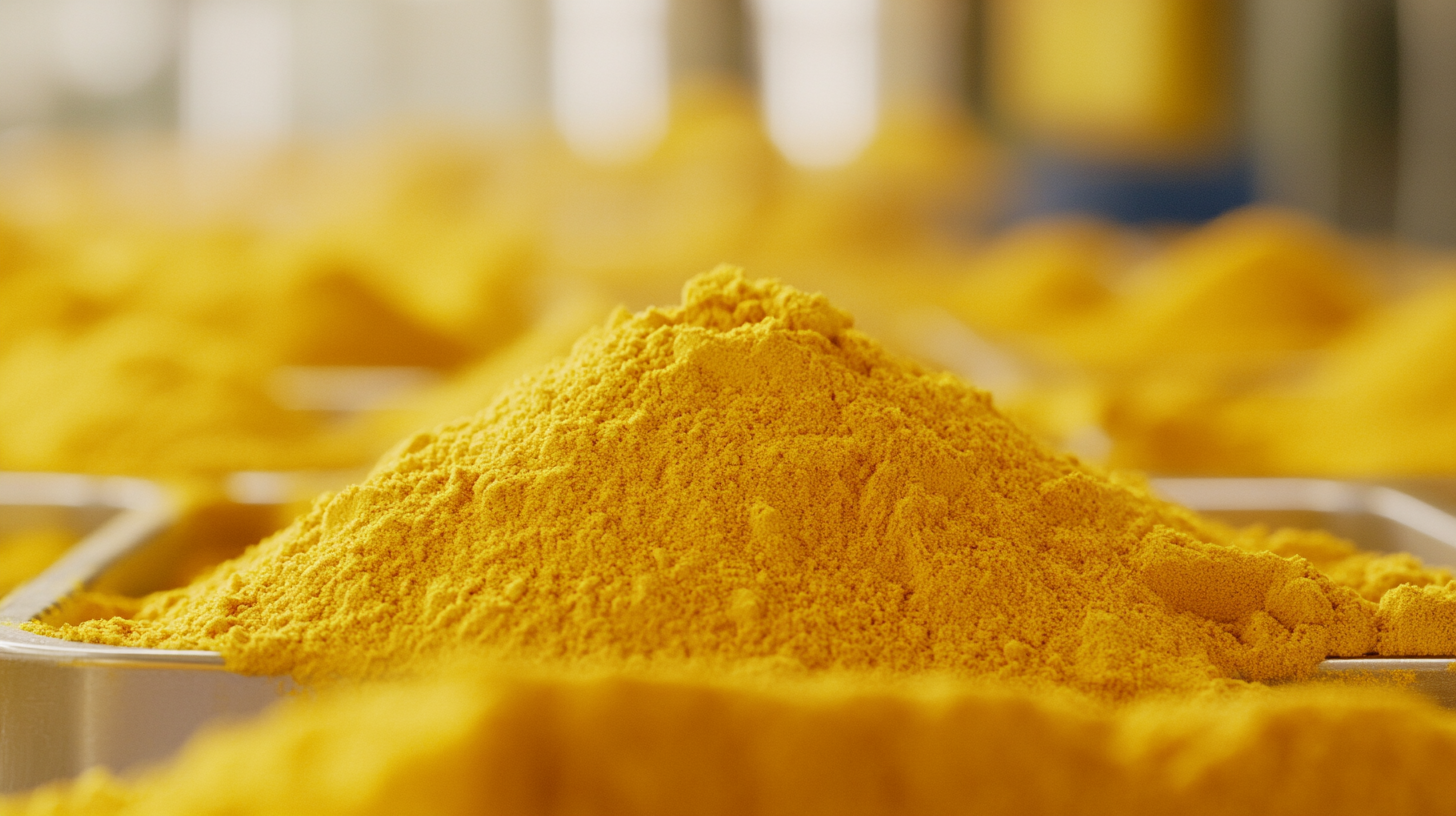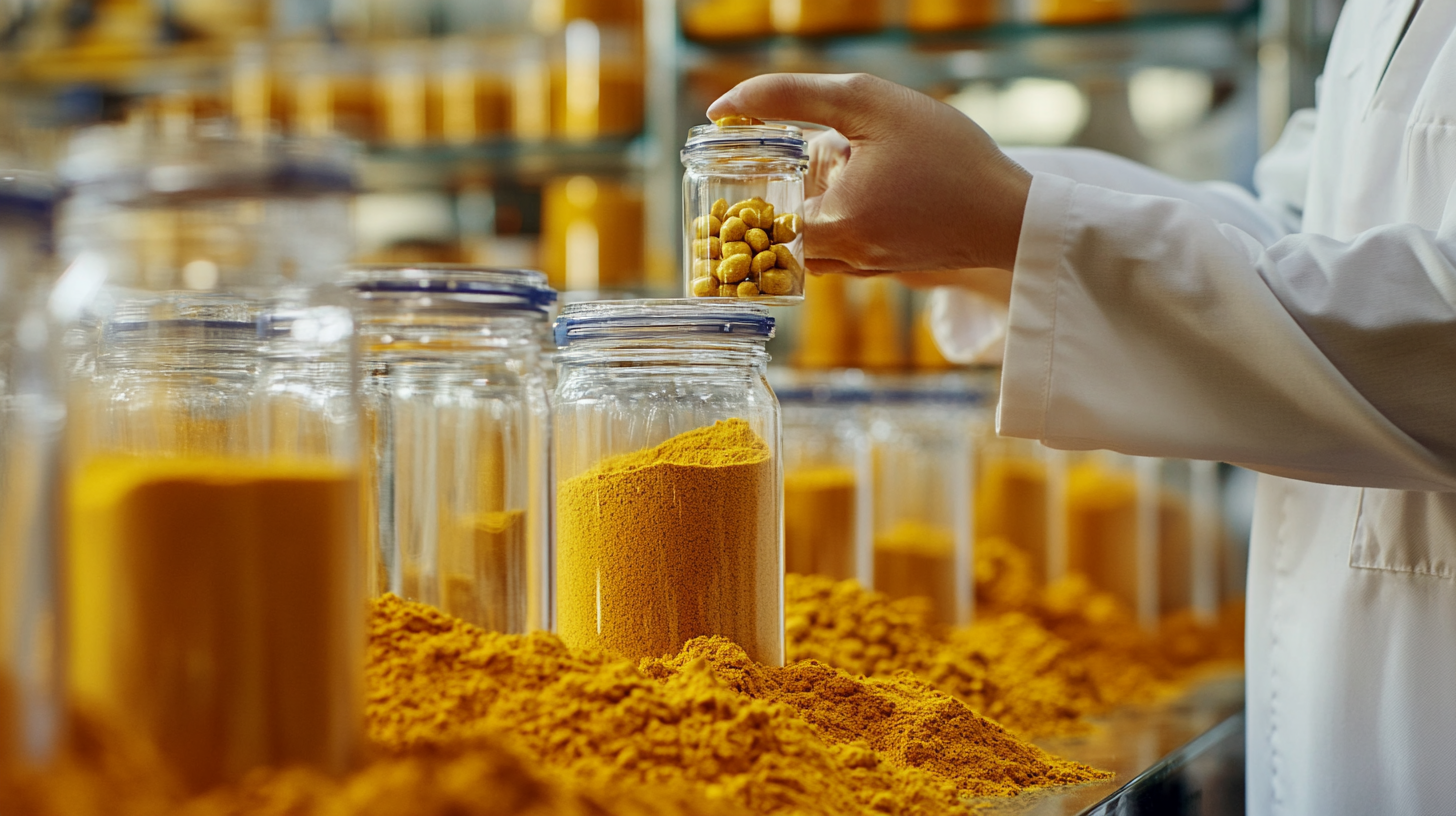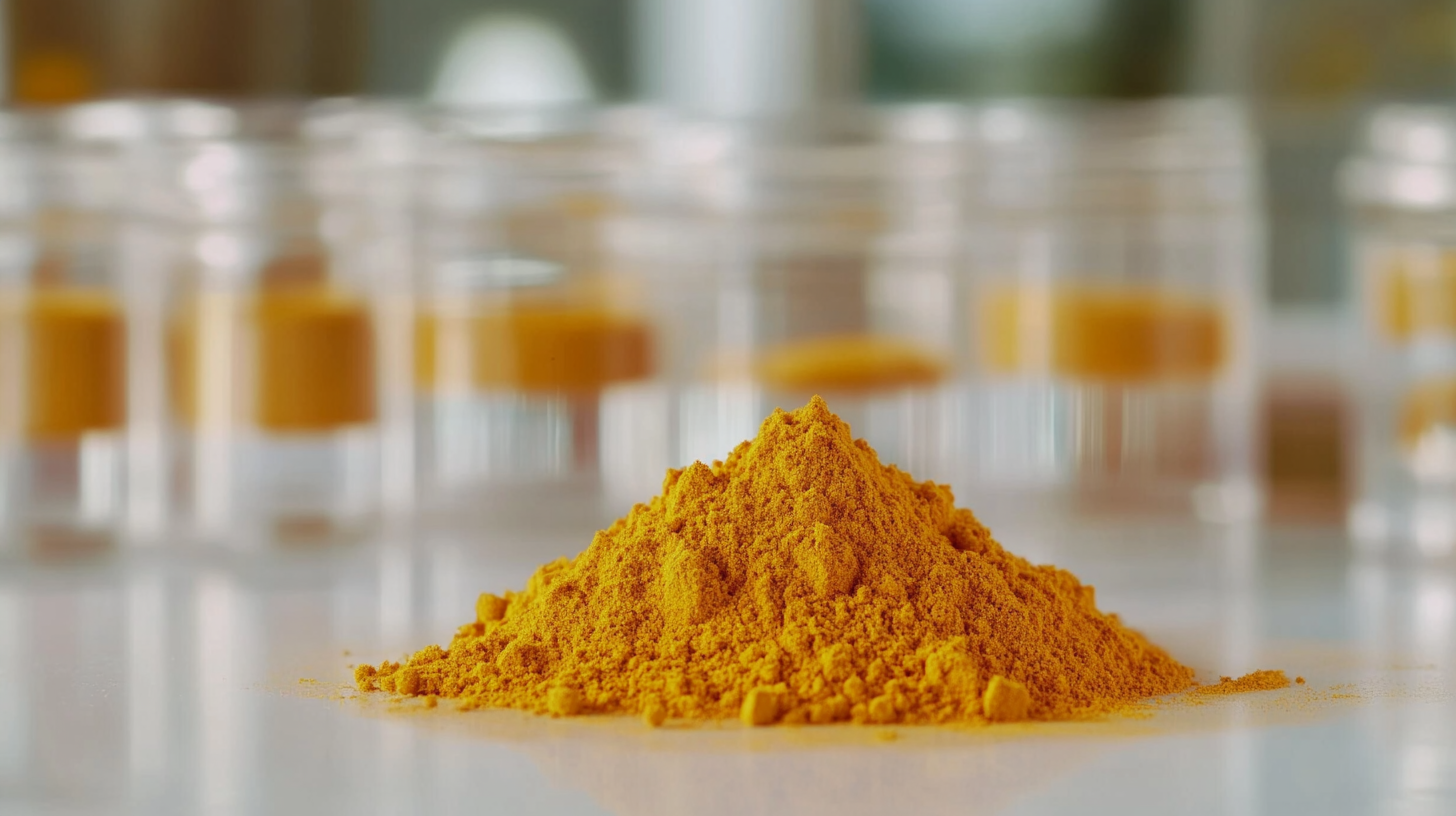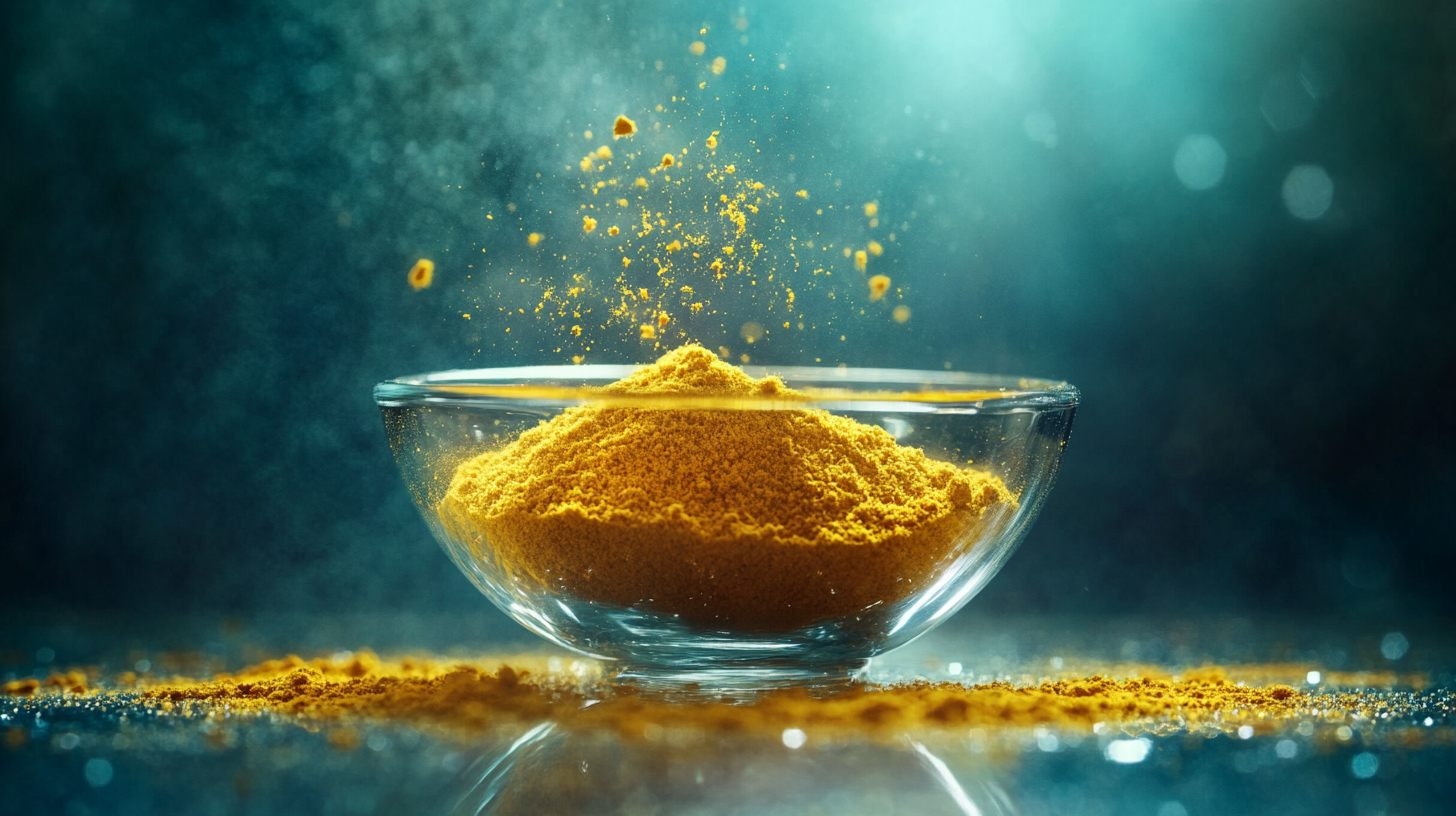50% Response rate
Ensuring Quality Compliance in Global Sourcing of Curcumin Extract Powder
In recent years, the global market for curcumin extract powder has witnessed significant growth, driven by its emerging applications in various sectors including food, cosmetics, and pharmaceuticals. According to a report by Grand View Research, the curcumin market is expected to reach USD 1.55 billion by 2025, expanding at a compound annual growth rate (CAGR) of 15.0% from 2019 to 2025. This remarkable growth underscores the increasing awareness of curcumin’s health benefits, including its anti-inflammatory and antioxidant properties, which have captivated both consumers and manufacturers alike.
However, as the demand for curcumin extract powder surges, ensuring quality compliance in global sourcing becomes imperative. Variability in product quality, purity, and sourcing practices can significantly impact the efficacy and safety of curcumin products. Reports indicate that as much as 30% of herbal supplements in the market may contain significantly lower levels of active ingredients than claimed, highlighting the critical need for stringent quality assurance measures. Stakeholders in the supply chain must prioritize compliance with international quality standards to maintain product integrity and consumer trust while navigating the complexities of global sourcing.

Understanding the Importance of Quality Compliance in Curcumin Sourcing
Quality compliance in the sourcing of curcumin extract powder is paramount, especially as the popularity of turmeric continues to soar. The increasing demand highlights the need for rigorous standards to ensure that consumers receive authentic products that truly deliver the promised health benefits. This concern is exacerbated by recent reports of economically-motivated adulteration in turmeric products, which raise significant questions about the authenticity and efficacy of many supplements available in the market. Understanding the quality parameters of curcumin is essential for both manufacturers and consumers. High-quality turmeric should possess a rich curcumin content, which is recognized for its powerful anti-inflammatory and antioxidant properties. Standards like carbon-14 and HPLC analyses are crucial in verifying the quality and authenticity of turmeric products, helping to protect consumers from subpar or adulterated options. With turmeric being promoted for various health conditions, from arthritis to digestive disorders, ensuring that sourcing practices maintain high-quality compliance is vital for the credibility of these health claims. The consumer trend towards natural supplements brings with it a demand for transparency in the sourcing of curcumin extract. Buyers are increasingly aware of the factors that influence their purchasing decisions, including the quality and integrity of the product. As we navigate this burgeoning market, prioritizing quality compliance not only safeguards consumer health but also reinforces trust in the emerging turmeric supplement industry.

Key Regulations Governing Curcumin Extract Quality Standards
Curcumin extract powder, derived from turmeric, has gained significant traction in the health and wellness market due to its purported anti-inflammatory and antioxidant properties. However, to ensure consumer safety and market integrity, it is crucial to adhere to stringent quality standards. Regulatory bodies such as the U.S. Food and Drug Administration (FDA) and the European Food Safety Authority (EFSA) play pivotal roles in establishing the guidelines that govern the quality of curcumin extracts. These regulations encompass aspects like sourcing, processing, and labeling, thereby safeguarding both consumers and manufacturers.
Recent reports indicate that the global curcumin market is projected to reach approximately $1 billion by 2026, underscoring the importance of compliance with these regulations. According to a report by Allied Market Research, the curcumin extract market is expected to grow at a CAGR of 14.5% from 2019 to 2026. This growth is not only driven by increasing demand for natural health products but also by the necessity for adherence to quality regulations. Manufacturers are now more than ever subject to rigorous testing protocols, including heavy metal and pesticide residue analysis, to ensure that the products meet the accepted safety and quality benchmarks.
Furthermore, the adherence to international quality standards, such as ISO 22000 and Codex Alimentarius guidelines, is crucial for companies looking to thrive in the global market. These regulations help facilitate international trade by ensuring that curcumin extracts meet agreed-upon safety levels across different markets. As companies engage in global sourcing, familiarity with regulatory requirements becomes an asset, allowing them to make informed decisions that align with both local and international standards. Emphasizing these quality compliance measures will not only protect public health but also enhance the credibility of curcumin extract manufacturers on a global scale.

Challenges in Ensuring Quality Compliance Across Global Suppliers
Ensuring quality compliance in the global sourcing of curcumin extract powder presents significant challenges for businesses. One of the primary hurdles is the variability in standards and regulations across different countries. Each region has its own set of guidelines for quality control, which can create confusion among suppliers, manufacturers, and retailers. This inconsistency leads to potential quality discrepancies, making it essential for companies to establish robust compliance frameworks that can adapt to various regulatory environments.
Moreover, the lack of transparency in the supply chain exacerbates the issue. Many suppliers may not disclose their sourcing practices or the quality of their raw materials, leading to uncertainty about the product’s integrity. Implementing rigorous testing protocols and audits can mitigate some of these risks, but the cost and logistics involved can deter smaller companies from ensuring compliance effectively. Therefore, fostering strong relationships with suppliers and promoting best practices in quality assurance becomes a critical strategy for businesses aiming to succeed in the competitive market of curcumin extract.
Another challenge arises from the growing demand for organic and sustainably sourced curcumin extracts. While consumer awareness pushes for higher quality standards, not all suppliers can keep pace with these expectations. Companies must navigate the balance between cost efficiency and quality assurance, dedicating resources to ensure that they are sourcing products that not only meet regulatory compliance but also align with consumer demand for sustainability. This evolving landscape requires a proactive approach from businesses to maintain quality and compliance in their global sourcing efforts.

Best Practices for Quality Assurance in Curcumin Production
Ensuring quality assurance in the production of curcumin extract powder is crucial, particularly as global sourcing becomes more prevalent. The dietary supplement industry, governed by current good manufacturing practices (cGMP), mandates the establishment of stringent quality parameters for each component involved in the manufacturing process. This is particularly relevant for curcumin, derived from turmeric, where authenticity and quality significantly impact both efficacy and consumer trust.
To achieve consistent quality in curcumin production, it is essential to adopt best practices that encompass thorough testing and validation of raw materials. This includes using advanced analytical strategies to confirm the purity of the turmeric source and to verify labeling accuracy. Recent studies have highlighted the importance of employing techniques such as carbon-14 analysis and high-performance liquid chromatography (HPLC) to detect any economically motivated adulteration in dietary supplements. By implementing these measures, manufacturers can ensure that their curcumin extract powder meets the highest quality standards, safeguarding both the integrity of their products and the health of consumers.
Moreover, educating farmers and suppliers about quality parameters is vital. Initiatives that promote registration and certification for naturally grown turmeric can enhance the credibility of the supply chain. By fostering collaboration between producers, suppliers, and manufacturers, the industry can collectively elevate its standards, assuring consumers that the curcumin extracts they purchase are genuinely effective and safe.
The Role of Third-Party Testing in Validating Curcumin Extract Quality
In the realm of global sourcing for curcumin extract powder, ensuring quality compliance is crucial, particularly in light of the increasing popularity of turmeric supplements noted for their anti-inflammatory benefits. As consumers seek effective products, the importance of validating the quality of curcumin extracts becomes paramount. One cornerstone in achieving this assurance is the implementation of third-party testing, which serves as a reliable method to evaluate the authenticity and potency of the curcumin being sourced.
Third-party testing provides an unbiased assessment of curcumin extract quality, examining parameters such as curcumin concentration, purity, and the presence of potential contaminants. This process not only verifies the product’s label claims but also helps safeguard consumer health by ensuring that the supplements meet established regulatory standards. With a wide array of turmeric supplements on the market, including capsules and powders from reputable brands, third-party testing emerges as an essential tool for manufacturers and consumers alike to identify high-quality products.
As interest in curcumin-derived supplements continues to grow, the role of thorough testing cannot be overstated. By relying on independent labs to confirm the quality of curcumin extracts, stakeholders in the sourcing chain can instill confidence in their products. This commitment to quality compliance not only enhances brand reputation but also contributes to better health outcomes for consumers who depend on these supplements for their wellness journey.
